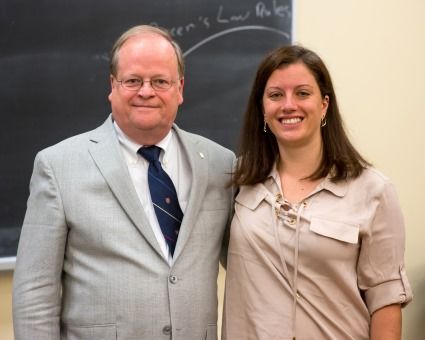
Queen’s Law students continue to be successful in securing placements in a variety of clerkships to work with judges in courts across Canada. Thirteen new grads have just begun clerking for a 12-month period and six have lined up positions for the 2018–19 year. It’s now time for students to consider clerking opportunities and the school is ready to help. First up on September 25 is an introductory information session.
Associate Dean (Academic) Cherie Metcalf and Assistant Dean Heather Cole will be discussing the various clerkships that students can consider, and the many possible ways that they can contribute to students’ career paths. “Students may have in mind only the most competitive clerkships, like the Supreme Court, but there are many other opportunities,” says Metcalf.
These include positions at various federal and provincial courts.
Each clerkship provides a different kind of experience for students. In some courts, students will work closely with a single judge for a year by providing research support, attending hearings, or assisting with writing judgments. In other courts, students will be part of a pool of clerks that support the work of the court; they will have an opportunity to work with multiple judges. Clerkships in appellate courts involve mostly legal arguments. Other clerkships are with trial courts, where clerks will be directly involved in the trial process from a judge’s perspective. Each clerkship concentrates on specific areas central to the work of judges, from tax and commercial law to administrative and criminal law.
The treatment of clerkships in terms of articling requirements varies a bit across provinces. In most provinces a clerkship will either meet, or substantially contribute to meeting, the articling requirements to be called to the bar.
Practising lawyer Pam Hrick, Law’13, has first-hand experience having clerked twice: first for Justice David Stratas, Law’84, at the Federal Court of Appeal and then for recently retired Justice Thomas Cromwell, Law’76, LLD’10 (Mus’73), at the Supreme Court of Canada. She is now an associate with Stockwoods LLP, where she maintains a broad practice in civil litigation, administrative law, criminal law and constitutional litigation.
“A clerkship can be an invaluable building block to a career in litigation,” says Hrick. “During a clerkship year, a clerk will often work closely with his or her judge, day in and day out. This provides tremendous insight into judicial decision-making, including the opportunity to observe litigators in action and discuss with judges what makes an effective advocate.”
For instance, clerking at the appellate level allowed Hrick to develop strong research and writing skills – essential elements for successful junior lawyers. “I was also fortunate to forge strong relationships with the judges I clerked for and have continued to benefit from their mentorship in the years since I finished clerking,” she adds.
Julie Banting, Director of Career Development at Queen’s Law, advises students not to become discouraged by the competitiveness of finding a clerkship. “I think a misconception is that only the top of the class should apply,” she says. “While that may be true for the higher-level courts, there are a lot of great opportunities at other courts that students should consider if they have an interest.” For example, the Superior Court in Ontario only hires second-year students and they have 20 positions that count toward articling as part of the licensing process in Ontario.
“Students should start thinking about clerkships early on in their law school careers, so they can have time to investigate the different opportunities,” says Metcalf, “Each one is different, so there may be things students want to do to try and be more competitive. Of course they should make sure that this is consistent with their own big picture ideas about what they want in terms of career paths. But a clerkship is a wonderful opportunity.”
The information session will be held on September 25, 2:00 pm – 2:30 pm, in the Moot Court Room. Students can register on CSM.
By Aschille Clarke-Mendes